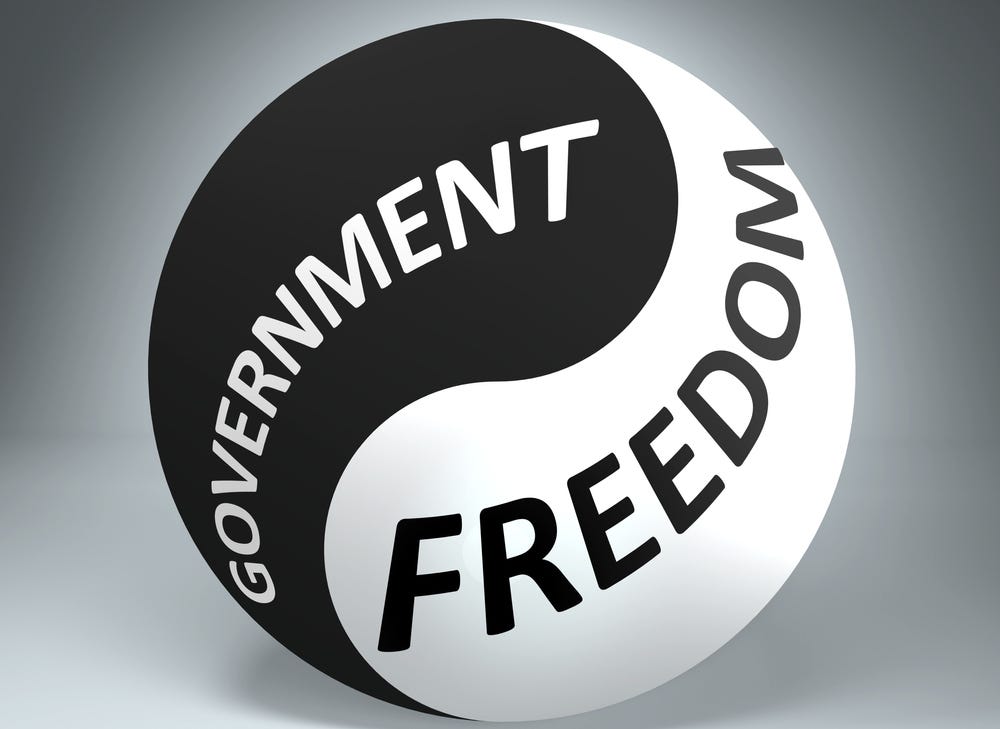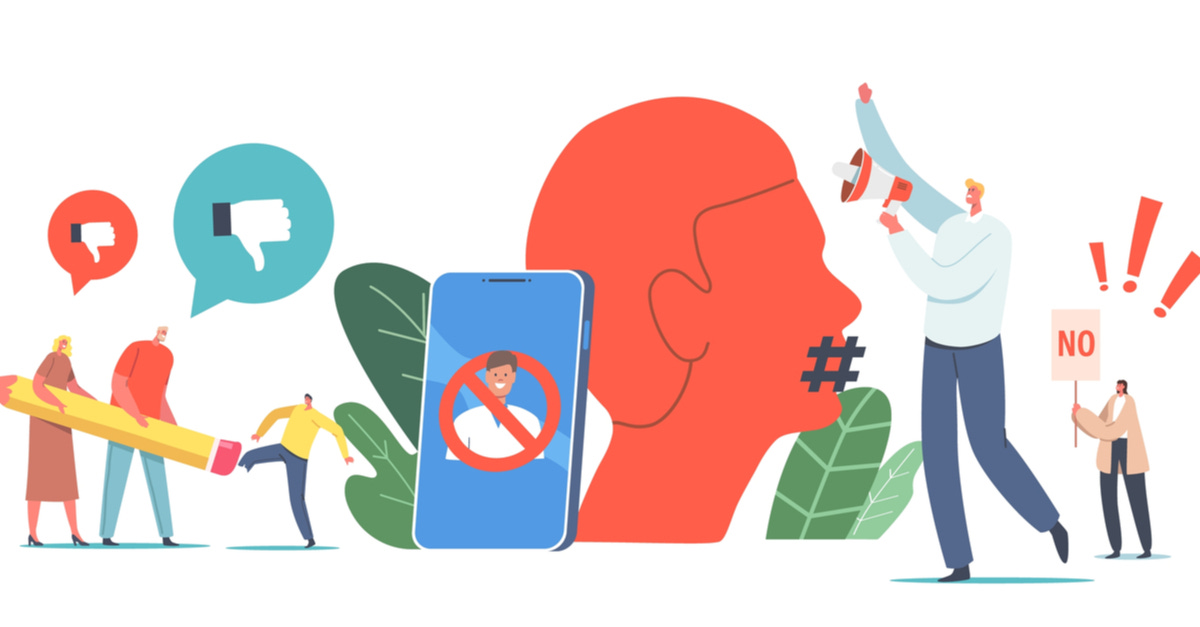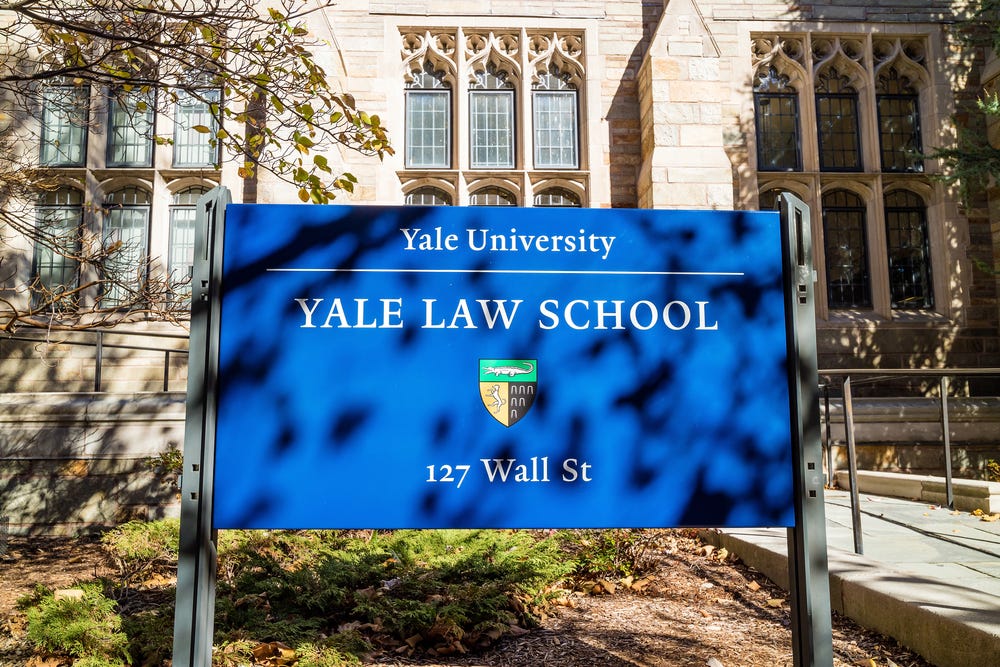E-Pluribus | October 26, 2021
Has the small government ship sailed once and for all, a Bad News review, and the student writer of the now infamous Yale Law trap-house email speaks.
A round up of the latest and best writing and musings on the rise of illiberalism in the public discourse:
J.D. Tuccille: Americans Now Prefer Smaller Government, But May Not Get It
While some Americans may say they want the government to do less, many lack the courage of their convictions, or, as J.D. Tuccille pithily puts it at Reason, “most Americans want to be left alone, but they don't want to leave each other alone.” Tuccille explains why reversing the growth of an expanding, intrusive government is so difficult when citizens value their freedom more than those of others.
Part of the problem might be that, while Americans have reverted to largely wanting government to leave them alone, they don't necessarily agree on what that means.
"Americans care about their freedoms, but what Democrats and Republicans see as liberty is quite different," Danielle Lussier, a Grinnell College associate professor of political science, observes of polling results published last week. "Democrats value the freedom to get an abortion, use recreational marijuana, and engage in public protest, while Republicans value the freedom to refuse vaccines, carry a firearm, punish children as they see fit, and seek religious exemptions from the law. Both sides appear to see freedom in narrow, partisan terms rather than through a lens of broadly shared individual rights."
Americans of both political tribes do agree that people should be free to become wealthy and to speak their minds. But they have wildly divergent views on many leave-me-alone issues. Tellingly, liberties that some Americans want to exercise in areas such as reproductive and self-defense rights are liberties that others of their countrymen want to restrict through the use of not-at-all-hands-off government power. That is, most Americans want to be left alone, but they don't want to leave each other alone.
Read it all.
Kevin Mims: Bad News—A Review
At Quillette, Kevin Mims reviews a book just published this month by Batya Ungar-Sargon of Newsweek entitled Bad News: How Woke Media Is Undermining Democracy. In the book, Ungar-Sargon chronicles the activist tendencies in journalism and how political and cultural preferences and even class differences impact the character and quality of many of today’s media outlets.
Ungar-Sargon cites the work of political scientist Zach Goldberg, who found that, from 2012 to 2016, “media outlets like the Times, the Huffington Post, and BuzzFeed began covering topics like white privilege, social justice, and institutional racism with exponential regularity…” This increase began right when the New York Times erected an online paywall to keep non-subscribers from reading its articles—a move sure to keep out lower-income readers. This meant that the Times, now more than ever, had to tailor its pages to a more educated, more affluent readership—exactly the kind of people likely to get excited by articles on intersectionality and systemic racism. “Goldberg further found that between 2013 and 2019, the frequency of words like ‘white’ and ‘racial privilege’ grew by an astonishing 1,200 percent in the Times, and by 1,500 percent in the Washington Post. The term ‘white supremacy’ was used fewer than seventy-five times in 2010 in the Washington Post and the New York Times, but over seven hundred times in 2020 alone; at NPR it was used 2,400 times,” or roughly 200 times per month!
The situation became much worse when Donald Trump entered the political arena. Executives at CBS, MSNBC, CNN, the New York Times, and elsewhere realized that Trump was a veritable goldmine. Once upon a time, the newsrooms and advertising departments at most media outlets maintained at least a semblance of independence from each other. But Trump’s ascent made young journalists at elite outlets want to do nothing but publish negative stories about him all day long. And this was exactly what the advertising department wanted as well, because the name Trump in an online headline pretty much guaranteed millions of clicks. “With the incentives so aligned,” writes Ungar-Sargon, “there wasn’t even really a need to break down whatever was left of the wall between advertising and editorial; it happened on its own. … It can both be the case—indeed, it is both the case—that Trump made a lot of very real mistakes as a candidate and president and that the media’s obsession with him went beyond all proportion due to an unignorable profit motive. … Trump drove sales, so Trump drove editorial.”
Read the whole thing.
Trent Colbert: Why I Didn’t Apologize For That Yale Law School Email
PLURIBUS’ Around Twitter on October 15 mentioned the Yale Law School controversy involving a party invitation email sent to other students by Trent Colbert. Now Colbert tells his own story at Persuasion, including the pressure and implied threats from Yale’s administration if he did not “apologize” in an acceptable manner, and what he believes is the wider impact such micromanaging of student speech and behavior is doing in higher education today.
I told them I did not want to send out a generic statement and would rather have individual conversations with anybody offended. I was told that things might “escalate” if I failed to apologize. I was told that an apology would be more likely to make the situation “go away,” and it was implied that there would be lingering impacts to my reputation because the “legal community is a small one.” The subtext behind the meetings that followed became increasingly clear: Apologize or risk the consequences.
They even went so far as to draft an apology for me directed to the Black Law Students Association (see below), which I declined to use.
[…]
It might be tempting to view my story as one about conservatives being discriminated against and prevented from sharing ideas freely in elite educational spaces. After all, Eldik explicitly identified my “association with FedSoc” as an especially “triggering” factor for students. But I believe this diminishes the full significance of what happened.
The important questions are about the wider culture that made the administration's intervention possible in the first place. Before they ever step inside a classroom to learn torts or contracts, first-year students are required to attend diversity and inclusion training which teaches us to see racism all around us in the form of microaggressions and implicit bias, prioritize lived experience, and engage in the confessional sacrament of acknowledging one’s privilege.
Around Twitter
Is Dave Chappelle too “powerful” to be affected by “cancel culture”? Maybe not…
It’s not always just the right that runs afoul of Big Tech. Reinstatement was quick in this case, but Novara is still looking for an explanation:
Noam Blum says that importance of “cancel culture” doesn’t just depend on the success of cancellations:
Finally, a reminder that social media efforts to police “hate speech” leave something to be desired:










